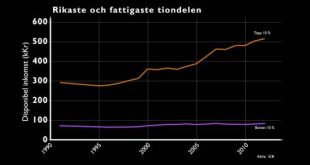Econometrics — fictions masquerading as science In econometrics one often gets the feeling that many of its practitioners think of it as a kind of automatic inferential machine: input data and out comes casual knowledge. This is like pulling a rabbit from a hat. Great — but first you have to put the rabbit in the hat. And this is where assumptions come into the picture. As social scientists — and economists — we have to confront the all-important question...
Read More »Stjärnorna kvittar det lika
Stjärnorna kvittar det lika [embedded content] Till minnet av Bengt — en vän non plus ultra
Read More »On the road to hell
On the road to hell [embedded content]
Read More »The logic of instrumental variables (student stuff)
The logic of instrumental variables (student stuff) [embedded content]
Read More »Macroeconometrics — the science of hubris
Macroeconometrics — the science of hubris When a macroeconometrician uses regression, he or she is implicitly saying, in effect, that the third quarter of 2007 is the same as the first quarter of 1988, once all factors that might be different between those two quarters are controlled for. The idea is that the economist is conducting an intertemporal quasi-experiment. But because there is only one economic history with which to work, there is a lack of...
Read More »Ta tillbaka jämlikheten!
[embedded content] Jättebra video. Låt oss hoppas att LO nu rejält påminner “sitt” eget parti om det gigantiska svek de utsatt sina väljare för. Historiens dom ska falla hård på ansvariga politiker — och inte minst på socialdemokratins Göran Persson, Kjell-Olof Feldt och alla andra som i deras fotspår fortsatt glatt traska patrull — som hänsynslöst och med berått mod låtit offra den en gång så stolta svenska traditionen av att försöka bygga ett jämlikt samhälle. Ett samhälle...
Read More »Selection bias and the elite school illusion
Selection bias and the elite school illusion [embedded content] A great set of lectures — but I still warn my students that regression-based averages is something we have reasons to be cautious about. Suppose we want to estimate the average causal effect of a dummy variable (T) on an observed outcome variable (O). In a usual regression context one would apply an ordinary least squares estimator (OLS) in trying to get an unbiased and consistent estimate: O...
Read More »R A Fisher — the father of modern statistics (1/4)
R A Fisher — the father of modern statistics (1/4) [embedded content]
Read More »Unquantifiable risk and financial stability
Unquantifiable risk and financial stability Meteorologists and insurers talk about the “1-in-100 year storm”. Should regulators do the same for financial crises? In this post, we argue that false confidence in people’s ability to calculate probabilities of rare events might end up worsening the crises regulators are trying to prevent … Unwarranted faith in the odds of rare events can set the stage for far worse outcomes. No matter how hard we try, we cannot...
Read More »Causality — the back-door criterion
Causality — the back-door criterion [embedded content]
Read More » Lars P. Syll
Lars P. Syll




